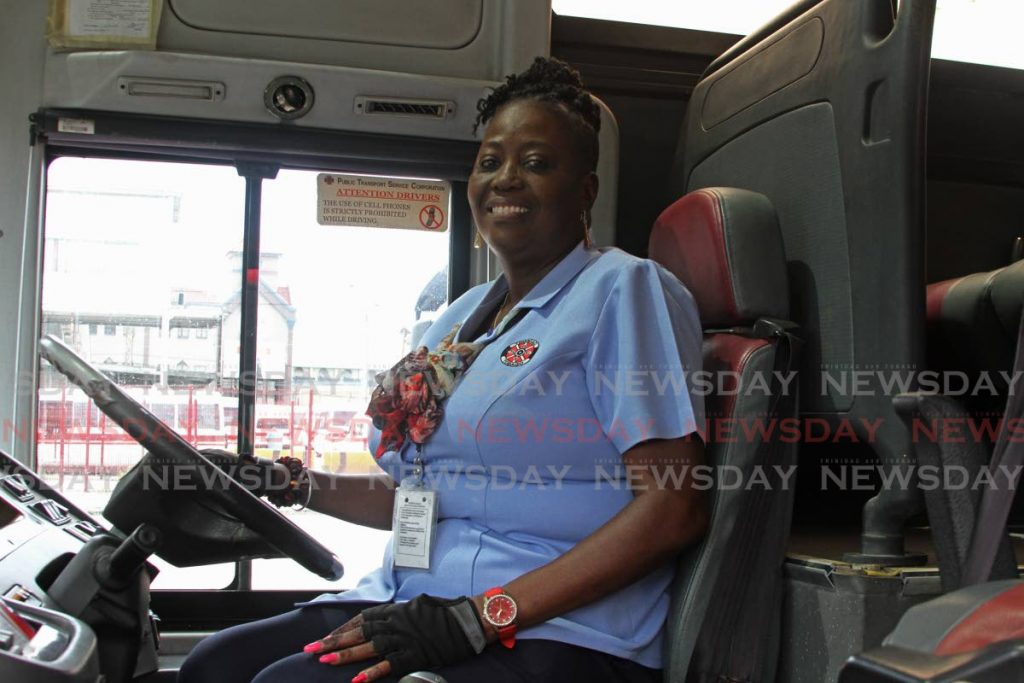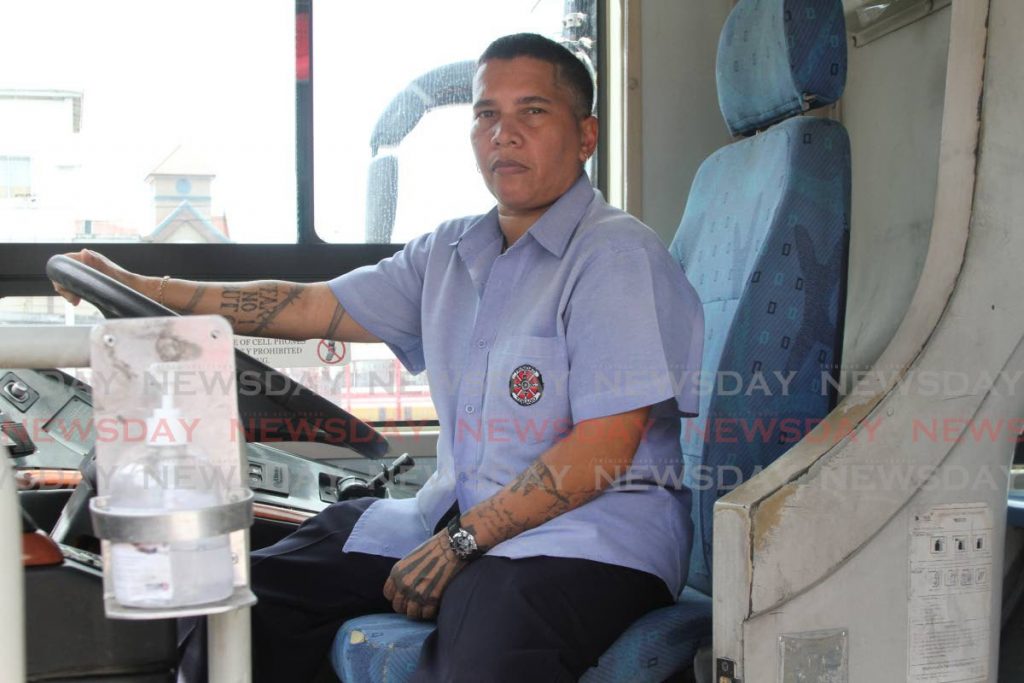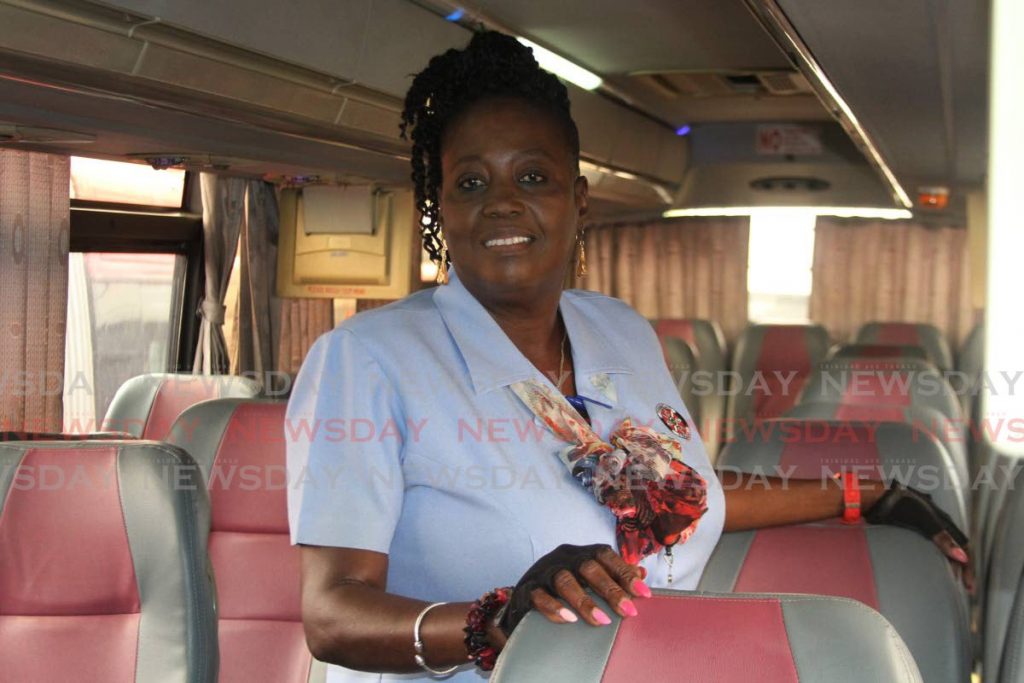PTSC's women of the road

A friend is relating a fun story about an adventure at Port of Spain's main transport hub, City Gate. She tells you the bus driver made a joke and she couldn't stop laughing.
Imagine what that bus driver looks like. Was your first thought, a man? If you did think it was a man, don't feel too badly.
Out of 556 drivers and conductors at the Public Transport Service Corporation (PTSC), 14 are women. That's less than three per cent.
Even without official data, it is clear to anyone who uses public transport that that figure is disproportionate to the number of women travellers. The reason for such a low penetration of women drivers may likely be because fewer women apply for the position.
WMN spoke to two of PTSC's 14 women drivers, Kathy Ann Garcia and Shirlyn Mark Thompson, about their reasons for applying to the male-dominated career and what's it like being women of the road.
Thompson, who is from Point Fortin, spent 18 years before becoming a bus driver playing the piano professionally and teaching music to children in South Trinidad.

Music was something her father loved and encouraged her to pursue. Music, though, was not her first love. Since she was 11, she wanted to be a bus driver.
"I will always remember the moment it happened. My parents took me to New York for vacation and we were going somewhere and took the bus, and it was the first time I ever saw a woman driving a bus," Thompson said.
She was awestruck, and the moment stayed with her for years. But Thompson had a problem.
How does one tell their parents they want to be a bus driver? For Thompson, the answer was clear. She couldn't.
"You crazy? You couldn't tell Daddy you wanted to be a bus driver, because in those days they looked down on bus drivers.
"So he liked music and I had to do piano. I studied music, did all my exams and was teaching music at a music school in Point Fortin. I loved interacting with children. I did that for 18 years – and got up one morning and said, 'Wait a minute, Daddy's dead and you need to do what you want to do and follow your dream.'"
Thompson had a chat with her husband and he encouraged her.
"I must say I was a little scared, because my mother was alive at the time and she said, 'Girl, you think you could drive that big thing?' She knew I liked to drive, because I used to steal my father's car and run away to drive and come back, but she still thought it was too big a vehicle for me.

"I told her not to worry."
In June 2010, PTSC called Thompson for an interview and she got the job. Her mother had died in January and would never know.
Thompson, who works from the San Fernando bus terminal, loves driving and the bigger buses do not intimidate her at all.
"I love to drive. I like that I can take myself anywhere, I don't have to wait on anybody.
"When my husband and I go out, I do most of the driving and with the training from PTSC for defensive driving and driving the omnibus, it allows me to see things differently when it comes to safety, so I feel better on the road. People in Trinidad love to run across the highway, so for me, from a distance I start to alert them by honking my horn. I've learned a lot."
Thompson's passion for driving is something she shares with her colleague Garcia.
Garcia, who is from St Joseph, drives the Arima route and is a bold personality in a surprisingly small package.
"The bigger the bus, the more excited I am to drive it," she said during an interview.
She acknowledged the irony, considering that if she steps off the bus, at four foot five inches, she can't see into the windows.
"When I come out of the big accordion bus, if I stand outside I can’t even see above the windscreen . People always react to that. People always ask if I can see over the steering wheel but the seats in the bus are designed to be adjusted so I see very well while on the bus."

Garcia applied to PTSC in 2008 and was hired in 2010. Out of 100 applicants at the time, hers was the only one from a woman.
"I wanted to drive a bus since I was around nine years old.
"I had a troubled childhood and I didn't live with my parents. I lived with an older lady called Miss Ama, and Miss Ama was always taking the bus. She would take the bus to church, to the grocery, to the prayer groups to pray for people who were ill – she would take the bus everywhere. I was like her tail, so I followed her everywhere."
Those were Garcia's first memories of public transport and even when she became an adult and started working in different fields, she thought fondly about driving a bus.
"While driving maxi I decided to sign up. I kept hearing people speaking about it and I came and asked for a form.
"I didn’t get a form, but they told me to do an application letter, so I did that. I submitted it in 2008, and I wasn’t getting feedback, so I went back to driving maxi and forgot about it."
One evening, in 2010 – Garcia recalled it was a Friday – the HR department called.
"The manager said she had 100 applications, all male, one female, and asked if I was still interested. She told me to go do my medical assessment and I was inside (hired) from there. I already had experience driving water trucks and bigger maxis.
"I’m one of the best in my field. My co-workers tell me this, and I’m proud of me.

"I don’t see this as a job. I get excited getting up to drive these buses.
"I meet people who come aboard and say they can’t do this, but I hope they know they actually can do it. Where I come from, I could have been on drugs, I could have done all the wrong things. But I chose not to do that, and now I am doing something I really love, and it makes me happy. "

Comments
"PTSC’s women of the road"